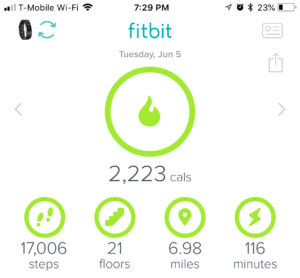This is an amazing story of a man in South Africa who was given a second chance at life by his employer. I don’t know any U.S. company that would do this. They enlisted the help of a coach to get this man in good health and back to work. He started at 529 lbs and was confined to a chair – he lived, worked a little, slept and ate in this chair. He was unable to continue working, so the company brought in a health coach and in 8 months, the guy lost 143 lbs. He regained mobility and is no longer at risk of losing his legs.
Weirdly enough, this story had me thinking about habits. I regularly get asked about this. People telling me laziness and lack of motivation is what they struggle with to make the changes necessary or to maintain healthy habits.
The book, The Power of Habit – Why We Do What We Do in Life and Business breaks down how the mind works and how to set yourself up for success mentally for anything it is you are trying to achieve in life.
How do we form habits?
Like driving a car and riding a bike, you never forget how to do those things. You don’t even have to pay attention so much when you are doing it, especially when you are taking a route you take many times. The habit of doing it many times cements it into a place in your brain where you could literally do it while sleeping and some people do as the book explores.
The book discusses how fast food becomes a habit, like my Saturday visits with dad. Every Saturday after dance or piano class, dad would take me to McDonald’s for a Happy Meal. I’m not sure how it started but it was a regular routine for us and how I was able to build my toy collection (the reward). But small shifts can end the pattern. For me, that ended when I went to high school and started taking public transportation. I no longer had Saturday rides to McDonald’s.
We form habits through behavioral chunks. There is a trigger, the habit is then performed and then a reward is obtained. This is the chunk. To make a healthy shift, you just swap out the unhealthy habit for the healthy habit and keep the trigger and the reward.
Cravings power the habit loop, not necessarily logic or science. For example, science says it’s bad for your digestive system to be processing food all the time. I know from personal experience that eating throughout the day non-stop causes IBS symptoms for me (gas), but sitting at the computer all day usually has me sauntering in the kitchen looking for something to nibble on. My craving is more stimulation or more excitement to break the monotony of sitting at the computer. My FitBit helped me with this one. On every hour, it makes sure that I walk at least 250 steps. If I didn’t, it gives me a buzz on my wrist telling me to get it in before time is up so I go get water and go for a walk. This is just the break I need to avoid continuously eating. It solves the craving I was looking for.
You can create healthy habits for yourself by isolating the problem, finding out what is triggering it, and what reward you’re after. My reward with food was to break the monotony. I got some excitement from the food. I just swapped food for an adventure to the water cooler and out to wherever for a walk instead.
What craving is driving your unhealthy habits?
You already have a ritual going so how do you alter it to fit the person you want to be in the world?
It’s easier to change old habits than create new ones. For example, you may be struggling to get your exercise habit going after a long day of work if your normal routine is to come home tired and you don’t usually do much except spend time with family because you’re mentally drained from making decisions all day. It may be helpful to fit it into your already established morning routine so it’s out of the way for the day.
For me, this looks like:
6 am – wake, use the toilet, brush my teeth, wash my eyes
6:30 am – make a smoothie for breakfast (I will consume this at 9 am)
7 am – workout (20 to 30 minutes)
7:30 am – shower and dress
8 am – head out to work
Most of that has been my normal routine. All I did was put the exercise piece in there, which means showering needs to go right after. My shower is my reward for having worked out. I get clean and feel brand new and energized. This is my own little ritual.
Because willpower is a muscle that gets tired the more we use it in the day, I front load my exercise and stock my kitchen with healthy foods so I don’t have a choice I need to make. The less choices, the less room for failure. This has a snowball effect on other areas of your life. This is why exercising regularly can lead to healthy eating, better money management, etc. You learn basically how to manage yourself so you can live your best life.
Belief is also helpful to make it stick and be more successful. This is why my coaching program works so well, because it has built in accountability and support. Same if you have a group of friends you workout with, it gives you something to look forward to and a support system. With a support system, you keep an optimistic mindset on your goals, which makes it more likely to be achieved.
Small wins and the use of visualization are both additional tools you can utilize to stay on track. Small wins would be something like sticking to your workout routine for 5 days. I love that FitBit does this where I get a report on how good I have been. It celebrates when I have a good day and a good week on my dashboard with digital confetti and a dancing man on my wrist, lol.

Use visualization to help plan out how you will react in challenging times. Think of specific situations. For example, if stress has you thinking about unhealthy snacks, visualize yourself back in the situation and leading to a better outcome of consuming healthier options or not using food at all to alleviate the stress. For me, I mitigate stress with my daily workout routine, creatively expressing myself with journaling and/or singing, and meditating. I do this on the regular instead of waiting for a stressful event. This helps me stay center so I am not thrown off balance due to other people’s energies, which I have learned I can be sensitive to.
I love this quote from the book: “The way we habitually think of our surroundings and ourselves create the worlds in which each of us inhabit”
How can you use this to help yourself?
Be positive and know that regardless of your challenges, you can find a way because God gave you a magnificent brain. People with less have figured out solutions to more challenging problems.

Wow this is really great ,I definitely enjoy reading it.
Sam very good information I will have to me strong at this stage of my life I have to be more disciplined